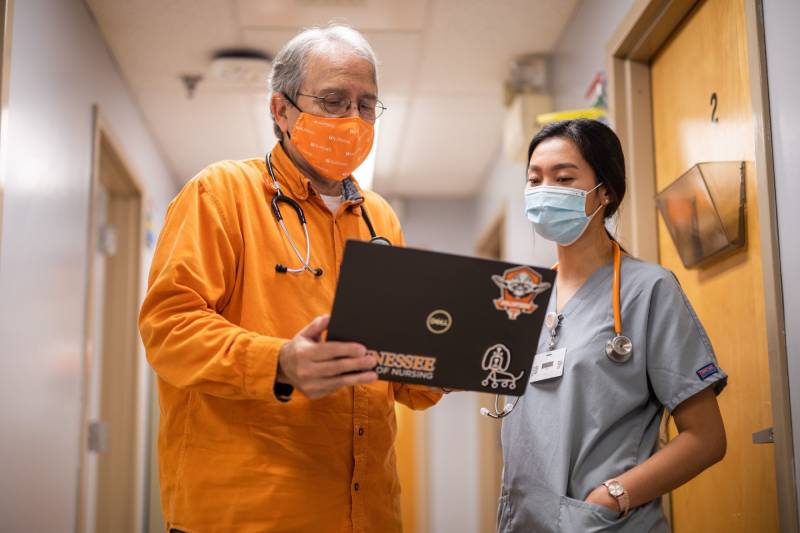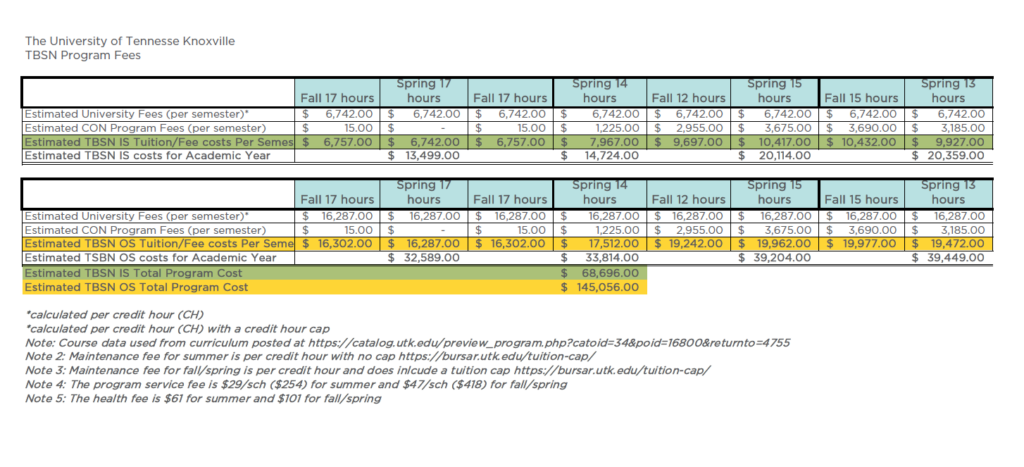Bachelor of Science
in Nursing (BSN)
The Bachelor of Science in nursing program combines the unique resources of the UT campus with health care agencies in a manner that enables both faculty and students to participate fully in all facets of the health care delivery system.
Facilities at the College of Nursing include a human patient simulator, a clinical practice laboratory, and technology enhanced classrooms. Clinical instruction is offered for students in major hospitals, community clinics, health departments, and schools in the region.
LEARN MORE
FRESHMAN ADMISSION
High school students apply for direct admission to the nursing major as freshman through the Undergraduate Office of Admissions. Freshman direct admission to the nursing major is a highly competitive application process.
The College of Nursing takes into consideration a wide range of factors when making admission decisions. Beginning with the fall 2024 freshmen direct admit pathway, we require students to complete the Holistic Admissions Questionnaire to be considered for admission into our Traditional Bachelor of Science in Nursing program.
The final deadline for high school students applying as a freshman to the nursing major is December 15 of the applicant’s senior year. Space for the nursing major is limited; high school students are encouraged to apply as early as August. Freshman applicants must indicate the major code of Nursing when applying through the UT Office of Undergraduate Admissions.
Applications received after December 15 will not be considered for admission to the nursing major.
Applicants may apply online through Undergraduate Admissions.
Applicants must meet the statewide US history requirement for a bachelor’s degree (either one unit at the high school level or 6 credit hours at the college level).
Note: Freshman applicants who anticipate earning more than 45 hours of dual enrollment credits or earning an Associate of Arts or Associate of Science degree upon high school graduation must contact the College of Nursing, Office of Student Services once they have submitted a freshman application to the Undergraduate Admissions Office.
TRANSFER STUDENTS ADMISSION
Current UT students and transfer students from other institutions can apply for an open position in the nursing program. The change of major and transfer student application is the secondary route for entry into nursing after the student has completed the required lower-division coursework and is ready to begin the junior upper division of nursing courses.
Application to the College of Nursing follows this process:
- Current UT students must submit a NursingCAS application to UT’s College of Nursing Student Services Office by November 20 for spring admission.
- Transfer students must submit the NursingCAS application and the transfer application through Undergraduate Admissions.
- Complete all required courses in the freshman and sophomore curriculum by July 15 prior to fall of junior year.
- Applicants are only permitted two (2) outstanding courses after spring semester. (Only one course can be a lab science).
- Meet the required minimum 3.2 cumulative grade point average at the conclusion of all required lower-division coursework. (Excess elective credit will not be counted toward this GPA requirement). Please note that meeting the minimum GPA requirement does not guarantee acceptance.
- Effective July 1, 1978, and afterwards, all students receiving a bachelor’s degree must have completed one unit of American history on the high school level or 6 semester hours of collegiate American history as required by the General Assembly of the State of Tennessee (Tennessee Code Annotated Section 493253). At UT, History 221-222 can be utilized to fulfill this requirement if it was not completed at the high school level.
Note: Students not enrolled at the University of Tennessee, Knoxville, who are applying to nursing must also complete a transfer undergraduate application to the University of Tennessee and the NursingCAS application. Transcripts sent to Undergraduate Admissions are not available to the College of Nursing, so students must also attach unofficial copies to the online change of major/transfer student application. Admission to the University of Tennessee through Undergraduate Admissions does not guarantee admission to the College of Nursing BSN program.
BSN SCHOLARS ADMISSION
The University of Tennessee Medical Center (UTMC) and the University of Tennessee, Knoxville, College of Nursing have partnered to create a new undergraduate nursing pathway at a satellite campus adjacent to UTMC. The BSN Scholars Program is a robust academic-practice partnership that will offer nursing students an opportunity to learn and train inside UTMC, the region’s academic medical center. Students accepted will attend class and complete their clinical rotations at UTMC with access to an onsite learning lab and simulation center at the satellite campus, which is located in the UT Research Park at Cherokee Farm. This program has the same accreditation standards and follows the same mission, vision, values, and honor code as the existing programs. Students in the BSN Scholars Program will have scholarship tuition from UTMC with a three-year work commitment post-graduation.
Application to the BSN Scholars follows this process:
- Current UT and College of Nursing students must submit a NursingCAS application to UT’s College of Nursing Student Services Office by November 20 for spring 2025 admission.
- Transfer students must submit both a NursingCAS application and a transfer application through Undergraduate Admissions.
- Complete all required courses in the freshman and sophomore curriculum by July 15 prior to fall of junior year.
- Applicants are only permitted two (2) outstanding courses after spring semester. (Only 1 course can be a lab science).
- Meet the required minimum 3.2 cumulative grade point average at the conclusion of all required lower-division coursework. (Excess elective credit will not be counted toward this GPA requirement). Please note that meeting the minimum GPA requirement does not guarantee acceptance.
- Effective July 1, 1978, and afterwards, all students receiving a bachelor’s degree must have completed one unit of American history on the high school level or 6 semester hours of collegiate American history as required by the General Assembly of the State of Tennessee (Tennessee Code Annotated Section 493253). At UT, History 221-222 can be utilized to fulfill this requirement if it was not completed at the high school level.
- Applicants will be required to submit a resume, and complete a virtual interview with UT Medical Center.
CURRICULUM
The baccalaureate nursing curriculum is guided by the following assumptions:
• Persons and their health and well-being are the focus of nursing.
• Nursing is a caring practice profession, an art, and a scientific discipline.
• Persons are influenced by a complex environment (both internal and external) that affects their health and well-being.
• A goal for nursing is to modify environmental factors to promote, maintain and restore health.
The curriculum integrates the themes of holism, diversity, and caring and emphasizes critical thinking, communication and leadership, and management principles and skills.
A broad base of general education, a thorough study of human behavior; an emphasis on health maintenance, promotion, and restoration; and a strong family and community orientation are all essential components of baccalaureate nursing education.
Maintaining a high-quality relevant program responsive to the increasing complexity of health care delivery, the changing health needs of society, and the changing and expanding role of the nurse enables graduates of the program to:
• Assume beginning leadership positions in a variety of settings
• Work collaboratively with other health professionals
• Function as socially conscious and contributing citizens
• Pursue advanced education on either a formal or informal basis
CATALOG
PROGRAM FEATURES
- Direct freshman admission to the nursing major
- Freshman Nursing Living and Learning Community on campus
- Active Student Nurses Association within the college
- Excellent clinical experiences at major hospitals, community clinics, health departments, schools, and other health care facilities in the region
- Highly qualified faculty who are experienced teachers, researchers, and leaders in nursing and health care
- Technology-enhanced classrooms and accredited simulation laboratory facilities
- Outstanding preparation for the NCLEX, the national licensing exam for RNs—UT College of Nursing graduates consistently exceed both the state and national pass rates
FEES

FREQUENTLY ASKED QUESTIONS
INFORMATION SESSIONS AND OPEN HOUSE
Due to the high volume of individual visit requests for prospective students, the College of Nursing holds Information Sessions for those interested in our nursing pathways. Below is information on which session is best for each student population.
- College of Nursing Open House: Students seeking to apply to the College of Nursing upon graduating high school can learn more about the freshman direct-admit process at this session.
- Transfer BSN Info Session: Current UT students and those transferring from other institutions may apply for an open seat in the Traditional BSN pathway. Those interested in learning more about this process should attend this session.
- BSN Scholars Info Session: Interested in having your tuition covered? The BSN Scholars pathway is a partnership between UT and UT Medical Center that helps students cover their tuition as they pursue a BSN degree. Those interested in learning more about this process should attend this session.
- BSN Scholars Open House: Students interested in the BSN Scholars pathway are invited to an Open House at UT Medical Center. Students will get the chance to hear from UT Medical Center staff and also learn more about the BSN Scholars pathway.
Participation in group sessions in no way influences admissions decisions. To reserve a spot in one of our upcoming Information Sessions, sign up online at the links below. Please refer to the information above to select which session fits your needs.
ARMY AND AIRFORCE ROTC PATHWAY
The College of Nursing partners with Army and Air Force ROTC programs to provide multiple pathways for nursing admission into the BSN program.
- Admission into the College of Nursing as a direct freshman entry, a student must have met all competitive criteria used by the faculty of the College of Nursing to earn one of the allocated seats for the freshman class.
- Admission into the College of Nursing through the Change of Major process a student must have met all competitive criteria used by the faculty of the College of Nursing to earn one of the allocated seats for the freshman class.
- If not accepted into the College of Nursing as a direct entry freshman, an ROTC scholar will have a second opportunity for review of admission prior to the start of freshman year. (Preference will be given towards two prospective students who were denied admission at time of review for the direct entry process). Admission into the College of Nursing as a freshman through this process must be selected jointly by the College of Nursing and ROTC. There is a two seat maximum for this pathway.